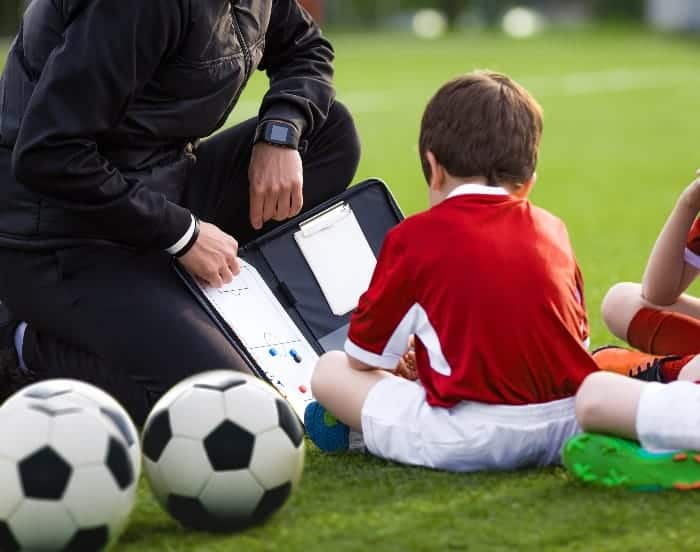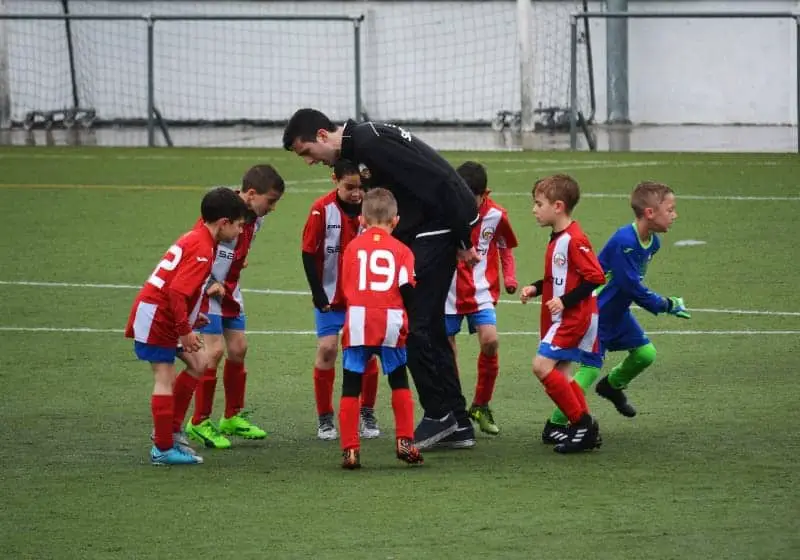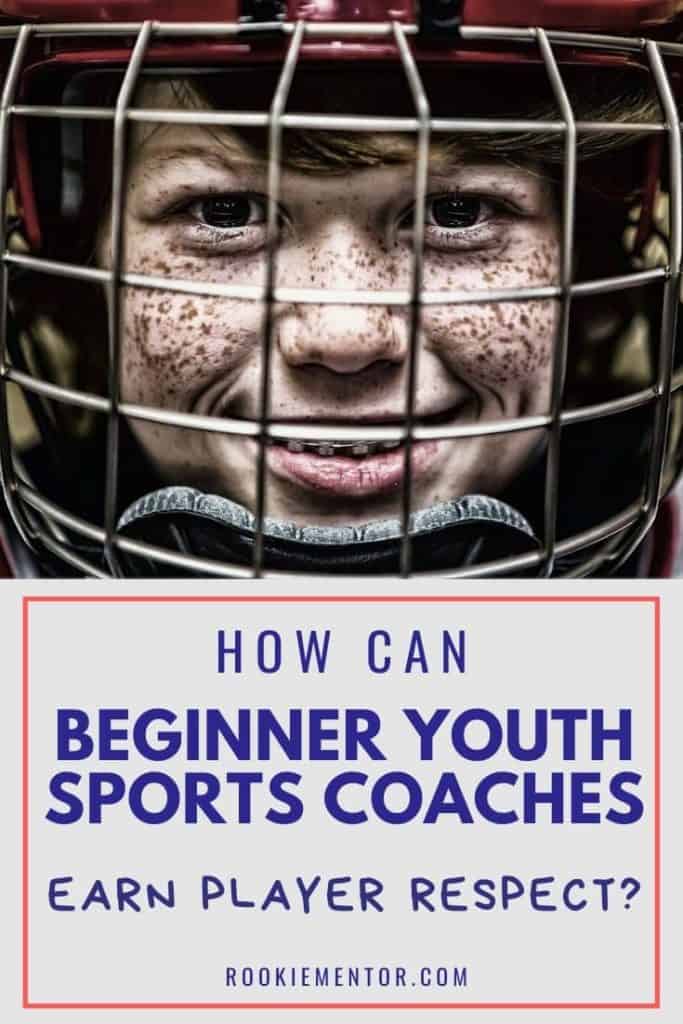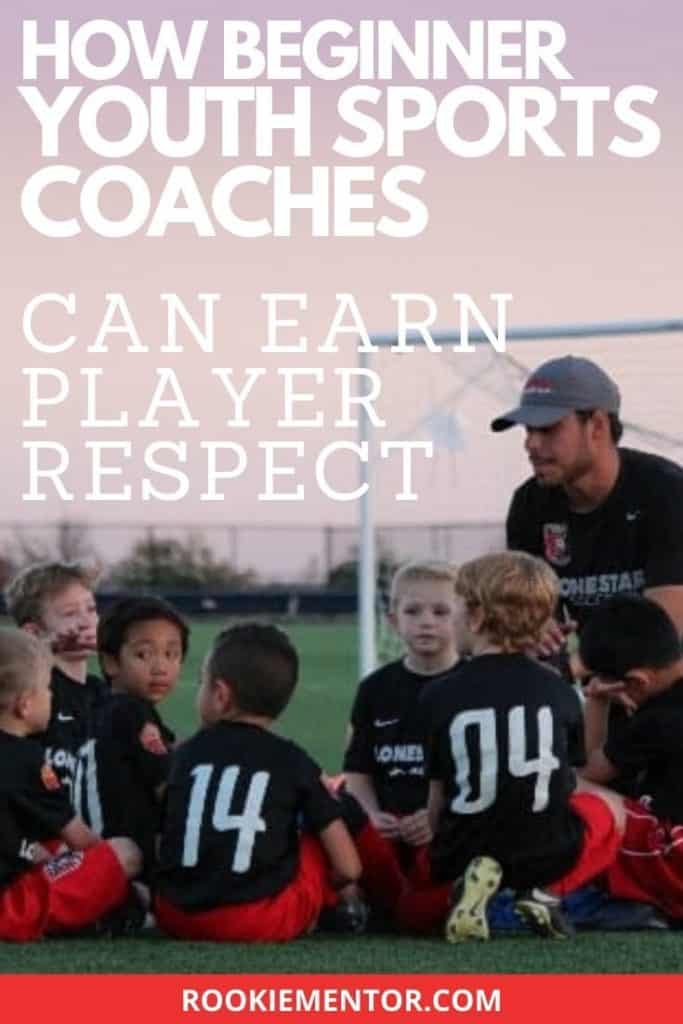Respect is earned, not given. A quote I’m sure you’ve heard somewhere along the line, however, extremely difficult for many people to put into practice. Now ask a 9-year-old child, who’s been holding in energy at school all day and is ready to release now practice is here, to listen to your every word and command when asked.
It’s time to put some strategies in place to earn this players respect and not speed up the process of obtaining grey hairs.

This post will take you over 4 areas that will assist with how beginner youth sports coaches can earn player respect.
Note – like any relationship in life, a 9-year-old child or coworker at the office, receiving respect does take time and there is no exact science to how you can get it. Be patient, continue to work at what’s detailed below and strive to iron out any bumps along the way. Respect sometimes has a funny way of showing itself.
Guide, Don’t Ride
If you are just starting out in coaching, I can’t stress this first point enough. But before I get into the detail, it’s important to understand some history if we are going to change your future coaching.
Being a big basketball fan, Bob Knight of Indiana was an extremely successful college basketball coach throughout the 1970’s & 1980’s. The way he coached his players throughout that period led to 3 national titles for his program and him being lauded as one of the all-time greats.
Feel free to research Bob Knight separate to this article, however, as the years progressed and the mindset of young athletes changed, his coaching practices didn’t have the same impact as once was. As this article headline suggests, Knight struggled to change with the times.
Children of today don’t respond the same way to those of yesteryear. So if you believe that raising your voice and ranting about a specific topic will lead to a greater impact and level of respect from your athletes, I’m here to suggest you might need to rethink your mindset.
An interesting article on the coach/athlete relationship talks about how coaches now should avoid “stopping and screaming as much, obviously still coaching but letting them (the athletes) problem solve. That is part of our job as well, empower our leaders to lead.” (source)
My history with coaching young athletes is similar. It’s near on impossible to gain the respect of that athlete by asking them to complete a drill, without explaining the “why”. They want to be guided into what’s the right way to complete a task or drill. Understand the steps it takes to become good at it and then be empowered to work out the resolution themselves in their own way.
This can be difficult for coaches, as we are trying to run a practice for a number of kids with different learning styles and ways of absorbing information.
However, if you are detailed with your explanation into the “why”, provide guidelines for how the skill/action/drill is to be completed and support rather than ride when things aren’t 100% perfect, athlete respect typically comes from this.

You Ask Your Players To Be Accountable, So Should You
I need you at practice 15 minutes before we start to warm up. We need to stop the other team on the next possession. I need 3 more goals this period, otherwise we’ll be doing sprints at practice.
Coaches are always seeking ways to find a level of accountability with players throughout practice and matches. And when hearing those statements in a way that resonates with the athlete, they’ll do everything they can to try and follow your instruction.
However, what would you think if that same coach then showed up to the next practice late, without a plan, sat down and blew his whistle whilst you are running all over field and only came to tell you something negative. Your view of that person is going to strain over a period of time.
If you’re asking your players to be accountable for certain actions throughout their interactions with the team, then you need to also showcase that same level of accountability.
Now the good news is, you get to set the rules as you are the leader. So you can create an environment that you believe puts your team in the best position to grow, though I would suggest you seek feedback first from the athletes or parents on priorities for them also.
It could be anything as big or small like;
- Everyone must make eye contact when talking to each other
- When a coach or player is talking, everyone must listen
- You must attend practice and games 15 minutes before start time to get warmed up
- We share a positive message after each practice and game
- There are penalties for not following instructions and rewards for achieving goals
- Parents need any changes to the schedule communicated as early as possible
Whatever you decide is important to your team and inner circle, it’s your job to uphold those standards and make sure everyone is held accountable to them. In doing so, players will see that effort and want to also follow your lead.

Treat Everyone How You’d Like To Be Treated
I’m sure you’ve heard this saying before.
My mother said it to me from a very young age and it has always stayed with me. I’m a believer in when you act a certain way around other people, it’s extremely difficult for them to showcase an opposite extreme emotion. This works in a positive or negative sense. It’s extremely rare I experience a moment when I was agitated with someone, who responded with an extreme act of kindness (yes, we all have a bad day sometimes).
So when coaching youth sports, it’s important we treat every individual we interact with the same way we’d like to be treated. This starts with the athletes themselves, however, it extends much wider than this. You must be the same toward anyone who interacts with your inner circle.
There is a mindset by some that youth sport coaches should steer clear of parents. Yes, there is a time and place for certain types of conversations. During or just after a game never recommended.
Related post: Obnoxious Youth Sports Parents: Your Role As Coach
However, if you’ve never taken the time to say hello to a kids mother or father, it’s difficult for them to support your views when having an open conversation with their child about an area for improvement.
Are you a coach who berates the referee every time you receive a call that didn’t go your way. What do you think your players see when you do this? How do you think that young, impressionable player will act the next time at practice when you ask them to complete a task they might not want to do at that time?
Our players see us as leaders and will eventually portray a persona of what they know.
So if a player knows nothing else but a coach who is always polite, engaged, accountable and thoroughly enjoys what they do, I’ve no doubt you’ll receive a similar interaction with your athletes; a big sign of respect.

Have An Open Door Policy
Now most of you coaching youth sports won’t have an office, but you get the idea here. Creating a culture of openness and transparency is what we are talking about. But how is this developed?
It starts with seeing the player as a person, not just an athlete.
Have you taken 5 minutes before practice to find out what a specific player’s interests are outside of your game? Are you supportive of those interests and do you ask how they going? As you are coaching young kids, sometimes this can be another sport, which you think could threaten the involvement in your game.
Embrace the diversity. Invite the children to be able to speak with you about anything occurring in their lives – on or off the field.
Related post: What are the Responsibilities of a Youth Sports Coach?
Now, this can’t be forced. However, at least knowing this is available to them can sometimes have a bigger impact on kids than you think.
The last point to this is how you handle difficult conversations. An open communication line could lead to some criticism for you, your coaching style or staff. Again, you need to embrace this. It’s taken a lot of courage for this young human to bring this to you. They are doing so because they feel comfortable to have the conversation. Hear them out and digest what they are saying. See if there is a way to alleviate some of that concern and put obtainable goals in place to work toward a resolution.
Having an honest and frank conversation goes a long way toward earning someone’s respect, when handled in the right way.

Summary: How Beginner Youth Sports Coaches Can Earn Player Respect
Earning the respect of any person is never easy. Some people will naturally give you respect from the start of a relationship, whilst others may be a little apprehensive.
Children will want to respect you as their coach, so you’ve already got off to a great start. Your challenge is to keep that respect and work with those who may have come into the team environment with a preconceived viewpoint.
Guide, be accountable, treat people how you’d like to be treated and always be open for a conversation. The message must be consistent, though delivered differently to each individual.
It might seem difficult, though I’ve got no doubt you can own this with some focus over time.
For existing coaches, how else did you gain the respect of your players when first starting out?
Cheers,
Daniel


